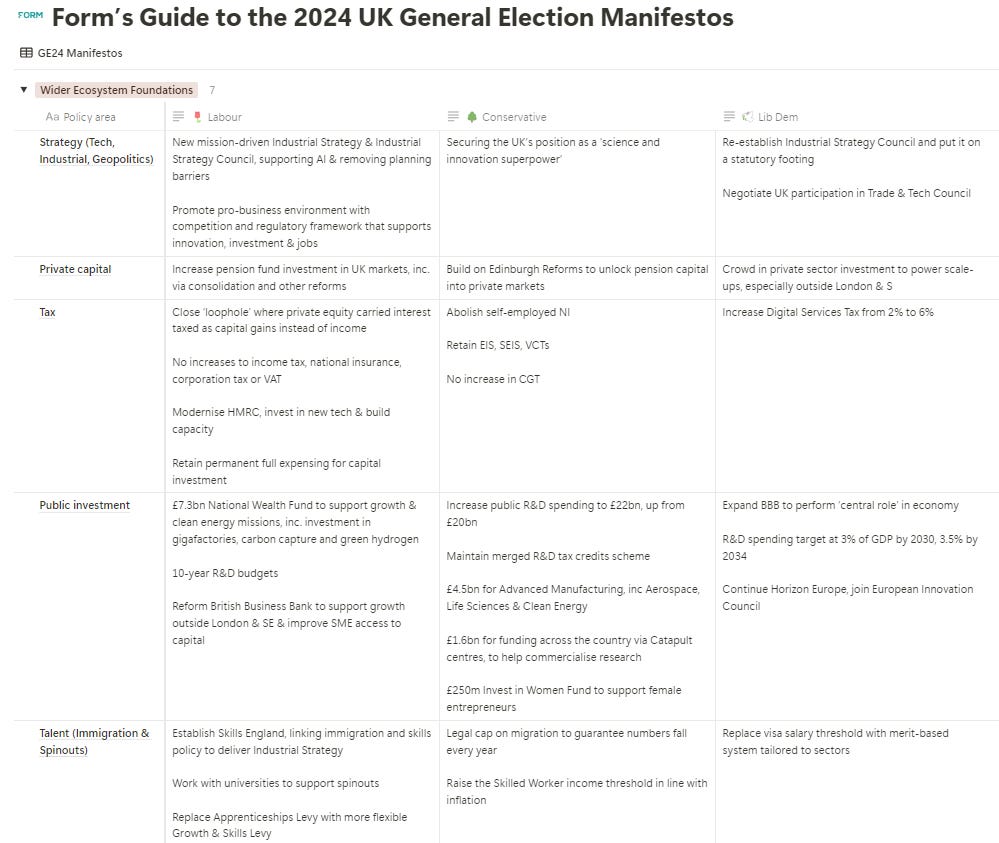Election Guide: Form's regulator proposals adopted
So, the manifestos for the UK general election are out. Everyone thinks tech is important. Everyone thinks AI is important. Everyone thinks investment is important. ✅✅✅
But what’s actually interesting? What might actually shift the dial? We’ve compiled a comprehensive guide (below), covering not just AI/tax/capital, important as they may be, but also social care, clinical trials, defence, fintech, energy, domestic heating and all the other knotty problems that we, you, and the government think about.
Here’s the tl;dr:
Welcome focus on fixing the operating reality for startups today: regulation, procurement & HMRC
Some big decisions, even if others dodged for now
Promising consensus on tech’s critical role, amid economic stagnation and geopolitical disorder
1. A welcome focus on fixing the operating reality for startups: regulation, procurement & HMRC
We launched our FixTheRegulators campaign because companies that otherwise had very little in common were all hitting upon a similar challenge: regulators that were either underfunded, inflexible or lacking in risk appetite were holding them back from moving quickly.
So, while we’re glad to see every manifesto acknowledge the need for regulatory innovation, we’re particularly pleased to see Labour plans to launch a dedicated Regulatory Innovation Office to speed up approval timelines, update rules and help accelerate technologies that span multiple existing boundaries. There's a long way to go yet, though: as we said in the FT yesterday, this is a big, interim win for startups & founders bringing much-needed innovation to regulated markets, but time will tell if delivery matches the potential.
Every manifesto also talks about improving procurement for startups. At times, as Alex Chalmers at Airstreet points out, this can be a little woolly. But particularly when it comes to NHS and MoD, there does seem to be genuine energy and intent across the political spectrum to reset procurement incentives and make these markets work for startups (and by extension, investors). Without this, companies in these sectors might do everything right yet still struggle. And sectors that are critical to the nation’s health and security won’t benefit from outlier founder attention, leaving us all worse off.
Finally, after years of meddling with R&D tax credits, while HMRC institutionally rots in the background, we’re glad to see commitments to improving capacity and fixing the mess.
2. Some big decisions, even if others dodged for now
Look, we don’t want to get too political, but we do think the UK’s compute infrastructure is probably more important than the preservation of pedestrian views over the M25 from bridge crossings (real story). So yeah, it is nice to see Labour planning to reform the planning rules that block data centres and so much other critical infrastructure being built. Elsewhere, both Labour and the Tories have committed to keep the existing AI policy framework — albeit with Labour putting the AI Safety Institute on a statutory footing so it has real power over frontier AI companies. And both parties are committed to Open Finance, even though the Bill that should’ve delivered this already fell away once the General Election was called.
But neither party has gone into much detail on issues like social care funding or AI and copyright, which require making some hard tradeoffs that political campaigns rarely look kindly on. Alas, manifestos are often pretty vague! And this time — particularly when the polls suggest one party has it all to lose — is no different.
3. Promising consensus on tech’s critical role, amid economic stagnation and geopolitical disorder
No doubt, there is still enormous headroom for all parties to accelerate scientific and technological progress. Tax and migration proposals may yet add friction. But after 14 years in government where the Conservatives have clearly championed the tech sector, it’s promising to see Labour’s clear commitment to partnering with industry.
We could see some challenges here, in both directions: startups are not arms of the state, and Labour’s focus on long term public value may not, understandably, always align with immediate private incentives.
But this partnership will be essential in a world where major technology shifts can quickly lead to economic and geopolitical reordering, where unfocused countries can quickly sink while others rise. Startups can help drive UK progress, not just when directly procured but also by transforming what’s possible and inspiring new solutions. They might even unlock advances that reduce the surface area of a problem that’s actually about thorny policy. We can either grow our stake in the future, or be tech- and price-takers forever. Whoever wins, we hope they grip this moment appropriately.



